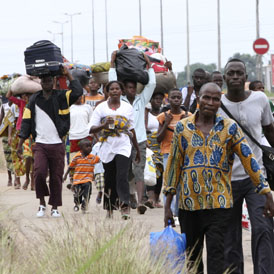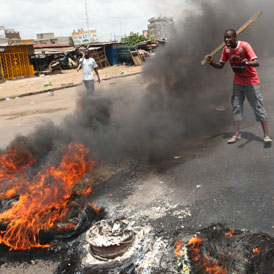Ivory Coast: ‘Genocide in the making’ says UN ambassador
Forces loyal to the disputed Ivory Coast leader Laurent Gbagbo gun down at least six unarmed women protesters as the country’s UN ambassador warns of “genocide in the making”

Soldiers backing the Ivory Coast’s defiant leader have opened fire at an all-female rally in support of his rival in the nation’s commercial capital Abidjan.
At least 400 people have been killed and hundreds of thousands have fled since disputed elections in November, according to UN estimates. Almost all of those killed were men who had voted for the internationally recognised winner of the election Alassane Ouattara.
The killing of the women has shocked a nation where all-female demonstrations are traditionally seen as a last resort for dissent.
Sirah Drane, who helped organise the march, said she was holding the megaphone and preparing to address the large crowd that had gathered at a roundabout in the Abobo district.
“We said to ourselves ‘they won’t shoot at women’. I heard a boom. They started spraying us.” Women’s protest organiser Sirah Drane
“That’s when we saw the tanks,” she said. “There were thousands of women. And we said to ourselves ‘they won’t shoot at women’. I heard a boom. They started spraying us. I tried to run and fell down. The others trampled me. Opening fire on unarmed women? It’s inconceivable.”
The UN refugee agency have been forced to halt plans to build a camp for an estimated 70 000 refugees in the Western part of the country because of security fears. In Abidjan, in the south, the UN estimates 200 000 people have fled the city.
In New York, the UN Security Council said it was “deeply concerned” about the escalation of violence in Ivory Coast and that it could lead to a resurgence of civil war there.
‘Genocide in the making’
Ivory Coast’s ambassador to the UN, Yousoufou Bamba- an Ouattara loyalist who draws his support from the mainly Muslim northern half of the country- says the situation is moving towards genocide, with people of northern origin and from the central region being targeted by violence.
“Today I will reiterate genocide is in the making,” he said. “They are killing people along ethnic lines. They are killing foreign nationals from foreign countries, from neighbouring countries. They are killing people who are opposed to Mr Gbagbo. That’s not acceptable,” he said.
Bamba has called for more international intervention and a stronger mandate for the UN peacekeepers stationed in the country.

Last year’s presidential elections – the first in ten years – renewed divisions along ethnic, religious and economic lines. Laurent Gbagbo, leader of the Front Populaire Ivorien (FPI), refused to accept results which gave his northern rival Alassane Ouattara, who leads the Rassemblement des Republicains (RDR), an 8 percentage point victory.
Multiple delegations of African leaders have failed to persuade Gbagbo to leave office, with the President rejecting all of their proposals, including offers of an amnesty and exile abroad.
Up until the 1990s Ivory Coast’s thriving cocoa industry meant living standards there were far higher than its neighbours. This attracted economic migrants from Mali and Burkina Faso who settled in the north. Overall a quarter of Ivorians are of foreign descent.
Ethnic tensions
Ethnic tensions had been suppressed under the leadership of Félix Houphouet-Boigny who was the first President since independence. He ran a one party state during his 33 year term but presided over a period of relative peace and economic prosperity that saw Ivory Coast become the world’s leading producer of cocoa by 1979. His death in 1993 coincided with a resurgence of ethnic violence in the country and economic decline.
He was succeeded by Henri Konan Bédié who was president when northerners originating from Burkina Faso were massacred in plantations at Tabou in 1995. Sporadic violence followed and in 1999 Bede was overthrown in military coup led by Robert Guei.
In the run up to the 2000 elections Guei introduced legislation, approved by a referendum, which required both parents of a presidential candidate to be born within the Ivory Coast. This excluded the northern candidate Alassane Ouattara from running.
Echoing scenes ten years later, Guei lost the 2000 election but proclaimed himself president, leading to a popular uprising which forced him to cede power to Gbagbo who was seen as the true winner.
In September 2002 civil war began. Troops loyal to Ouattara mutinied and launched attacks in cities across the country. On the first night of the uprising former president Robert Guei was killed .
Relative peace resumed in 2003 and a government of national unity was established, which survived until 2009 – despite Gbagbo’s refusal in 2005 to hold an election after his original presidential mandate had expired.
In 2007 the country was officially reunited in a peace deal.